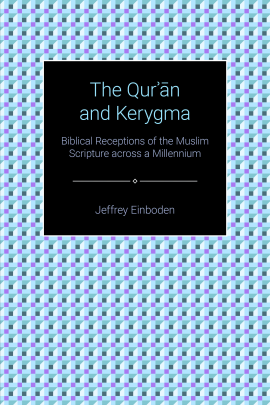
The Qur'an and Kerygma
Christian Readings and Literary Renditions from Late Antiquity to Postmodernity
The Qur'an's biblical foregrounds have long formed a controversial concern within Qur'anic Studies, with field-leading scholars debating the Muslim scripture's complex relationship and response to the Judeo-Christian canon. This contentious subject has largely overshadowed, however, a reciprocal,... Read more
Published: 2018
Pages: 256
eBook: 9781781794104
The Qur'an's biblical foregrounds have long formed a controversial concern within Qur'anic Studies, with field-leading scholars debating the Muslim scripture's complex relationship and response to the Judeo-Christian canon. This contentious subject has largely overshadowed, however, a reciprocal, yet no less rich, question which motivates the present study. Rather than read the Muslim scripture in light of its biblical antecedents, The Qur'an & Kerygmaadopts the inverse approach, situating the Qur'an as itself the formative foreground to Western literary innovation and biblical exegesis, stretching from late antiquity in the 9th century to postmodernity in the 20th. The book argues, in particular, that Qur'anic readings and renditions have provoked and paralleled key developments in the Christian canon and its critique, catalyzing pivotal acts of authorship and interpretation which have creatively contoured the language and legacy of biblical kerygma. Structured chronologically, the study's span of more than a millennium is sustained by its specific concentration on four case studies selected from representative areas and eras, exploring innovative translations and interpretations of the Qur'an authored by Christian literati from 9th-century Andalucia to 20th-century North America. Mirroring its subject matter, the book engages a literary critical approach, offering close-readings of targeted texts frequently neglected and never before synthesized in a single study, highlighting the stylistic, as well as spiritual, influence on Western authors exercised by Islamic writ.
Jeffrey Einboden is an Associate Professor at Northern Illinois University, and author of Nineteenth-Century U.S. Literature in Middle Eastern Languages (Edinburgh University Press 2013); Islam and Romanticism: Muslim Currents from Goethe to Emerson (Oneworld 2014); and The Islamic Lineage of Literary America, forthcoming from Oxford University Press. His research into Islamic sources and the Western canon has appeared in journals including Milton Quarterly, Translation and Literature, Middle Eastern Literatures, and the Journal of Qur'anic Studies; in 2006, his "The Genesis of Weltliteratur: Goethe's West-ostlicher Divan and Kerygmatic Pluralism" (Literature and Theology; 2005) was named by OUP as one of the "100 seminal articles" published by Oxford Journals in the past century.
| Cover | Cover | ||
|---|---|---|---|
| Contents | v | ||
| Acknowledgements\r | ix | ||
| Introduction\r | 1 | ||
| Chapter 1\r | 9 | ||
| Chapter 2\r | 35 | ||
| Chapter 3\r | 56 | ||
| Chapter 4\r | 81 | ||
| Chapter 5\r | 102 | ||
| Chapter 6\r | 124 | ||
| Coda\r | 144 | ||
| Bibliography\r | 148 | ||
| Index\r | 157 |
